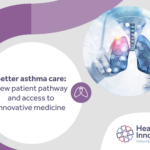 Improving respiratory care and diagnosing conditions earlier is a priority identified in the NHS Long Term Plan. An estimated 60,000 people in England who have severe asthma would benefit from biologic therapy, but uptake has been low with fewer than one in five getting this innovative and potentially life-changing treatment.
Improving respiratory care and diagnosing conditions earlier is a priority identified in the NHS Long Term Plan. An estimated 60,000 people in England who have severe asthma would benefit from biologic therapy, but uptake has been low with fewer than one in five getting this innovative and potentially life-changing treatment.
Asthma biologics help to manage symptoms and reduce relapses and reliance on other medicines such as oral steroids. Asthma biologics were selected as part of the NHS Accelerated Access Collaborative (AAC) and AHSN Network Rapid Uptake Products programme (RUP) led by the Oxford HIN which has transformed patient pathways. There are five NICE recommended biologics for severe asthma: omalizumab, mepolizumab, reslizumab, benralizumab and dupilumab.
Almost 5,000 more people with severe asthma are benefitting from biologic treatment. This has led to better symptom management, fewer asthma attacks and reduced long-term side-effects related to other treatments. There have been additional cost savings for the NHS and reduced pressure on emergency beds.
In addition, we created a practical guide for respiratory professionals which aims to benefit patients and reduce the environmental impact of asthma treatments. It contains information on how to identify severe asthma, as well as guidance on reducing the carbon footprint of inhalers and optimising effective inhaler prescribing.
Read more about transforming asthma care
‘New name … same aim: Building on a decade of health innovation’

